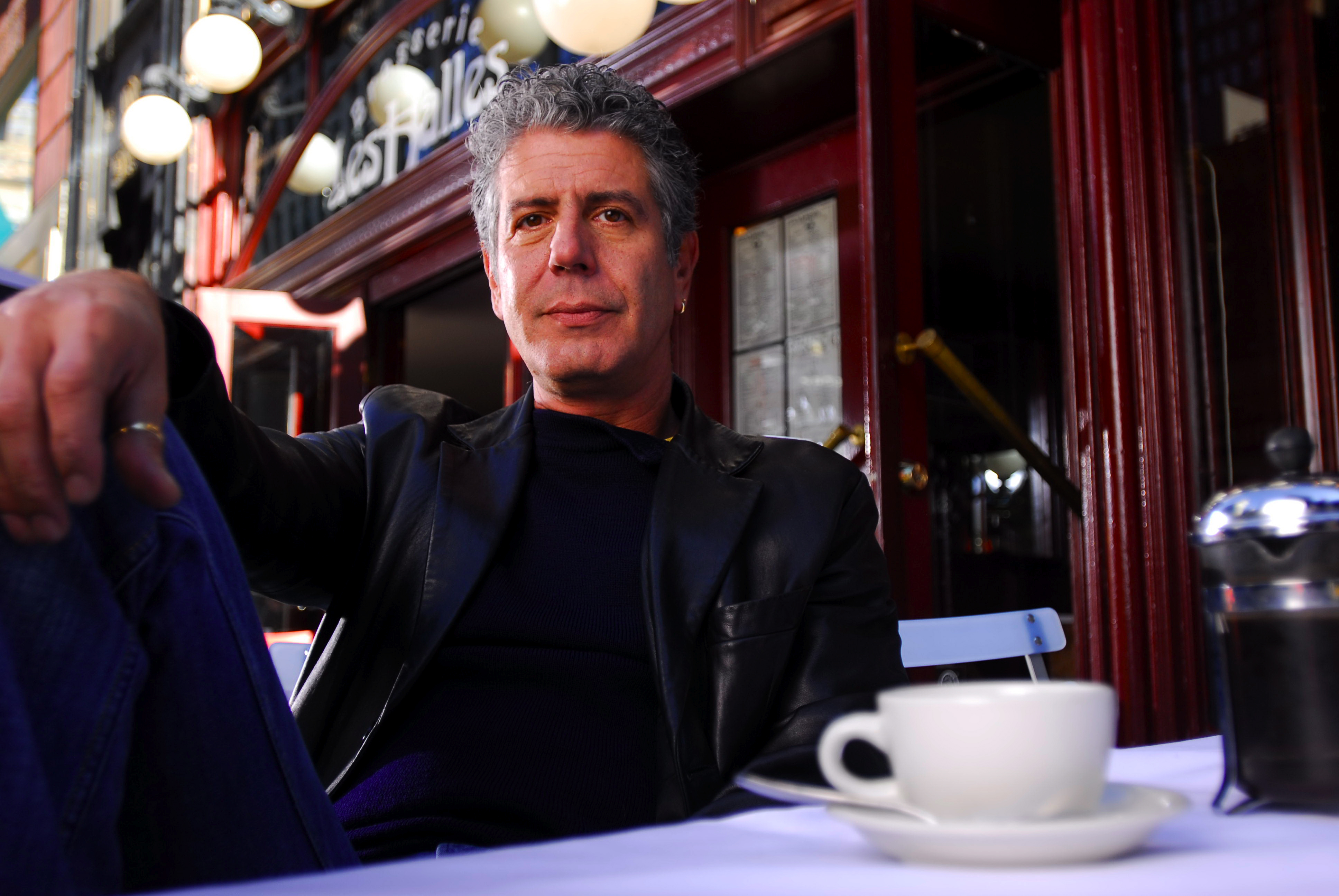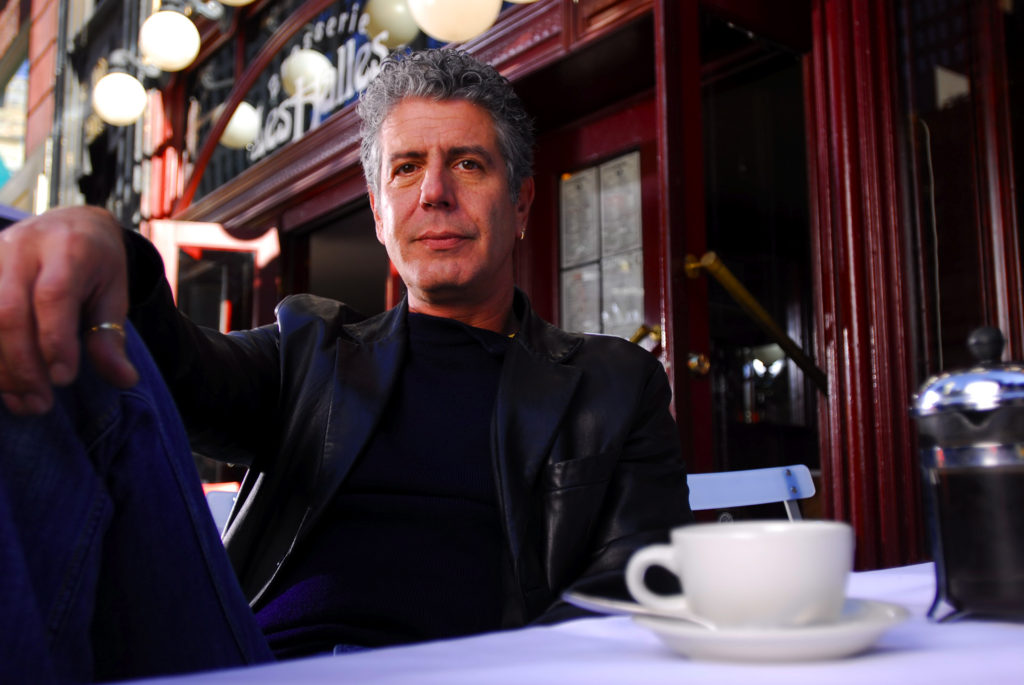By Jeff Maisey
In January 2011, I interviewed Anthony Bourdain as a preview for his speaking engagement at Chrysler Hall that winter.
His No Reservations program — the predecessor to CNN’s Parts Unknown series — debuted in 2005 on the Travel Channel, and the world of travel television changed forever.
Before Bourdain, most viewers tuned into Rick Steves’ polite look at Europe “through the backdoor,” which featured the slightly goofy host taking in the major sites as well as interacting with the locals. Steves’ programs remain a staple on Public Television.
Contrasting with Steves’ clean-cut, Middle American vibe, Anthony Bourdain’s impact was immediate. He was a brash New Yorker, part aged punk rocker, half beat poet, wandering the globe in a leather jacket, cigarette in hand, spewing profanity and full of attitude as he focused on food rather than the tourist sites and accommodations, taking viewers to locals-only spots and paling around with someone obviously in-the-know.
His host the Travel Channel describes his show: “In the world of a cook, an understanding and appreciation of how others eat is akin to discovering secret societies and cryptic subcultures. Cooks have special access. As always, the food is only the first glimpse of a wider view of how people live their lives in faraway lands and unfamiliar territories.”
Bourdain is a celebrity chef that first made a name for himself with the best-selling book Kitchen Confidential: Adventures in the Culinary Underbelly.
I spoke with Tony Bourdain by phone while he was shooting anepisode of No Reservations in South Boston. Here’s our conversation.
In addition to eating and drinking your way through each episode of No Reservations, viewers also see the iconic cigarette in hand. You’ve now given up chain-smoking. Has that changed your image?
I gave it up around the birth of my daughter three years ago. I didn’t want to smoke around her because I have a small apartment on the 22nd floor (in New York City). There’s no way I’m going to take an elevator down every time I want a cig. It finally became more difficult to smoke. I never felt obliged to die in a leather jacket with a cigarette hanging out of my mouth. I’m a dad now in his 50s.
How much research goes into choosing a location and finding a local person with knowledge of the culinary landscape?
Either a little or a lot. Hopefully a lot. If there’s a personal connection or a friend I know from the area, a historical obsession or a book that interested me about the place…I come at it from that angle. We usually have a local contact scouting locations. We have somebody on the ground who spends all week or often weeks running around looking to see if they’ll let us shoot there. Or would it be any fun at all? Is it interesting?
How many hours of footage to you shoot for an episode?
Ummm…I guess we average about 70 to 80 hours for 42 minutes.
The January 26, 2011 episode was filmed in the Azores. Was that your first time visiting the location and what did you find unique about the culture compared to Portuguese?
Yeah, it was.
I was particularly interested in the Azores because I started cooking out at Cape Cod in Massachusetts. The first Portuguese food I was exposed to was Azorean style and from people whose families came from the Azores on whaling ships many generations earlier. Much of the Portuguese community in New England and Cape Cod came from that part of the world.
I love that food and since I had a past with it, that why we went there. It has that Chilean reflection in it. It’s spicy. I love the sausages. The seafood dishes. It was very different and a lot blander cuisine than in the north of Portugal, which is the only other part of Portugal I’ve been in. I haven’t been to Lisbon yet.
You’ve been to so many places around the world and within the United States. What are the challenges in finding new locations and keeping the show fresh?
It’s a big world. There are plenty of places to go. I think we’ve done three or four in China. China alone is so enormous we could easily just make shows in China for a season.
But as far as making it fresh, we try very hard to change the game; change how we tell stories; how the show looks, sounds, feels, mood, tone, types of locations. After last year, which was a fairly comfortable year with comfortable locations like Paris, Rome, Madrid…I think we’re very aware that while we fell in a comfortable groove we changed the game this year by shooting in a lot of locations that are very difficult, both physically to shoot in, but also difficult situations for a travel show. We shot in Haiti during a cholera outbreak, Nicaragua, Cambodia, a place with a very tragic past that’s not the most cheerful place in the world. We’re shooting in The Congo, Yemen. So we’re certainly stepping outside of our comfort zone this year, if not a lot.
What kind of safety concerns do you have in some of these locations?
There are safety concerns, sure. After the Beirut (episode), we have to take things seriously. We travel with security when we’re in a real hot spot, whether it’s because of terrorism or if there’s a place with no infrastructure. Places like Liberia where there’s not much of a functioning government, we have to have security. If we’re shooting is a Hezbollah neighborhood in south Beirut, we have people who advise us whether now is the time to get back in the van and leave. Be assured we are with trained, experienced people when we are in Yemen and The Congo.
Sharing food is a very personal, intimate experience. Do you see yourself as a cultural ambassador?
I would never say I represent anybody or anything. I think every American tourist, every American visitor to another country, especially when it comes to something as personal and representative of a culture as food, which is something people take very seriously, should try to be polite. I try to observe local customs, or at least be aware of them and be sensitive to the situation on the ground. I try to keep in mind what impression we’re leaving where ever it is we go.
A recent episode of No Reservations showcased Berlin. I was certainly aware of a sizable Turkish population in Germany, but your programmed really spotlighted how strong a presence Turkish food has in German society. Did other things impress you about Berlin and are there other cities where the multi-cultural facet caught you by surprise?
Well I knew about a larger Turkish presence in Berlin. I think any place that has large populations of immigrates are only made more interesting by that. Certainly the large Armenian population in Beirut was a very happy surprise for me. Those kinds of anomalies. You can find yourself in Minneapolis and you become aware of a huge Vietnamese population, or in Houston. Those are enormous assets in making a place more interesting. I tend to not like homogenous places where all the flavors and all the culture is monochromatic. I like when cultures mix. I love Singapore because of that, with its many different types of Chinese and Indian. So, yeah, I have a natural aversion to cultures that are isolated and unaffected by other cultures. I think with the exception of Japan, which is just so kooky and fun. That’s one exception.
Is New York City still the best city to dine out?
To dine? Probably. Well…I don’t know. If you’re talking about sitting down in a traditional dining situation, you could find a good argument for San Sebastian in Spain or Barcelona. Fine dining, white table cloth, New York is still top of the heap in America for sure.
Best is hard to say. There are a lot of exciting things going on in Paris.
For straight out eating, New York is not the best. For everyday eating there are places with multiples of thousands of choices of different exciting street foods and eateries – Saigon, Hong Kong. Actually, Hong Kong is probable the best place in the world to eat.
Food and travel seem like a natural pairing for a travel show. Did you think success would be immediate?
Oh my god, no. I assumed when you’re trying to make television that’s different from everything else that it would be cancelled quickly and it will fail. Television in general, I think we’re really an anomaly. I have as much creative freedom to decide where we go and how we tell the stories as anyone who has ever enjoyed in the history of television. I certainly did not think that would last, much less succeed.
So there’s obviously no pressure to film in popular tourist destinations like London or Paris?
There’s no pressure to go anywhere ever. We went to the Travel Channel because the Food Network had given us an earlier series and then gave us pressure not to do anymore Asia shows. They didn’t want us to do shows and use subtitles. They wanted happy barbeque shows. We’re not here just because we like making television. There are better ways to make a living. We want to go to places we’re curious about and interesting to us. We make shows that we can be proud of. If that equation changes, please let us and I’ll go back to making brunches.
Do you travel outside of work and what locations do you prefer?
My wife’s Italian, so we try to spend as much time as possible in Italy seeing family and hanging out. I’m very happy there. It’s relatively new to me. I came late to Italy. That’s where we go for vacation.
What is the audience in for when you “appear” here in Norfolk at Chrysler Hall?
I come out. I talk. We take questions from the audience. People are free to ask whatever they like, how ever belligerently. The second half of the presentation is a conversation with the audience. To the extent that people ask interesting questions or raise important issues, the show will rise or fall. What’s my favorite restaurant in Norfolk is not going to be a good question. My answer would be, “I don’t know.” I haven’t been. I don’t have an advance team (for these appearances). This is a one-man band. I get on the plane with a carry-on bag and I fly to town and do my thing.





